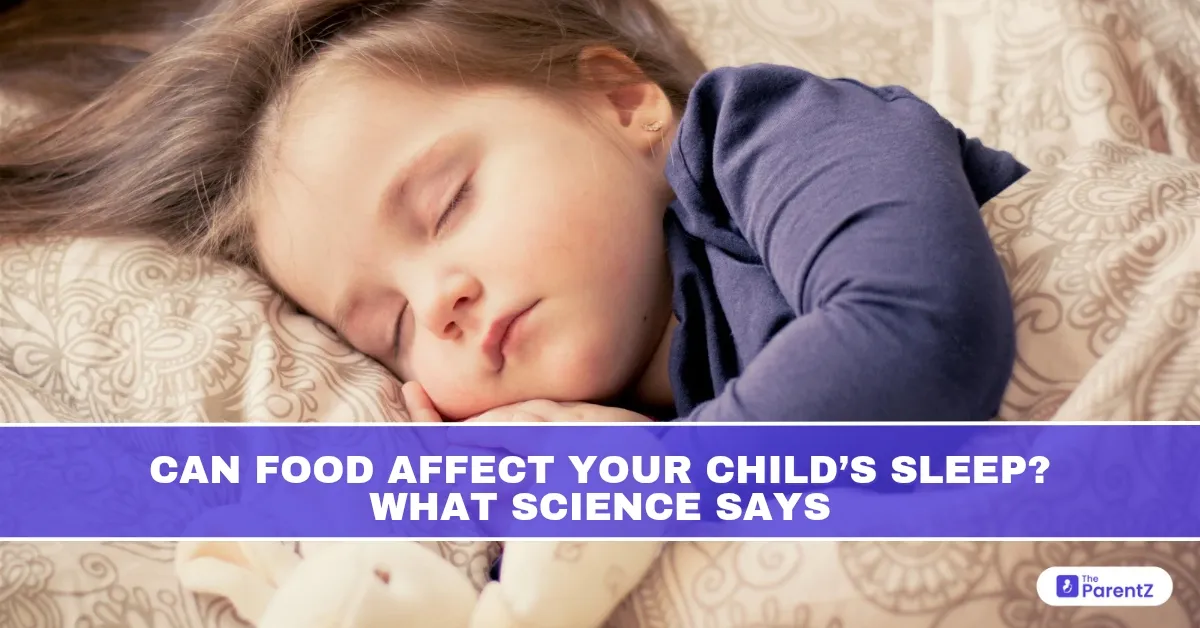Sleep is one of the most important factors in a child’s growth and development. But if your child struggles to fall asleep or wakes up frequently during the night, you might be wondering—could food be the culprit?
Science says yes. What your child eats can directly impact their sleep quality. Just like certain foods boost energy, others can either help promote restful sleep or disrupt it. According to the American Academy of Pediatrics (AAP), children aged 6–12 need 9–12 hours of sleep per night, while teenagers need 8–10 hours. However, studies show that up to 50% of children experience sleep disturbances, often linked to their diet and eating habits.
So, what does science say about food and sleep? Read below this article to explore how certain foods can help or harm your child’s ability to get a good night’s rest.
Foods That Promote Better Sleep in Kids
Here are some excellent food choices that help promote better sleep in kids.
Dairy Products – The Natural Sleep Aid
A warm glass of milk before bed is a classic remedy for a reason. Dairy products like milk, yogurt, and cheese are rich in tryptophan, an amino acid that helps the body produce melatonin, the hormone that regulates sleep. Studies show that children who consume dairy regularly tend to fall asleep faster and experience fewer nighttime awakenings.
How to Include It: Offer a small bowl of yogurt or a glass of warm milk an hour before bedtime.
Bananas – The Sleep-Boosting Superfruit
Bananas are packed with magnesium and potassium, two minerals that relax muscles and help calm the nervous system. They also contain vitamin B6, which boosts melatonin production. A study published in the Journal of Research in Medical Sciences found that magnesium-rich diets improve sleep duration and quality in children and adults alike.
How to Include It: Serve banana slices with peanut butter as an evening snack or blend them into a smoothie.
Oats – A Natural Source of Melatonin
Oats contain melatonin and complex carbohydrates, which help regulate blood sugar and keep energy levels stable throughout the night. Research suggests that kids who eat whole grains like oats tend to sleep longer and wake up less frequently.
How to Include It: A small bowl of oatmeal with honey before bedtime can help your child sleep soundly.
Nuts and Seeds – The Tiny Sleep Enhancers
Almonds, walnuts, flaxseeds, and sunflower seeds contain healthy fats, tryptophan, and magnesium, all of which support relaxation and better sleep. A study published in Nutrients found that children who consume magnesium-rich foods fall asleep faster and experience deeper sleep cycles.
How to Include It: Sprinkle nuts or seeds over yogurt, oatmeal, or add them to a smoothie.
Foods That Can Disrupt Sleep in Kids
On the contrary, here are a few food choices that may actually disrupt sleep in kids.
Sugary Snacks and Drinks – The Sleep Stealers
High-sugar foods like candy, soda, and sweet cereals cause spikes in blood sugar, leading to bursts of energy followed by crashes. A study in the Journal of Clinical Sleep Medicine found that children who consume high amounts of sugar are more likely to experience restless sleep and nightmares.
Tip: Avoid sugary snacks at least two hours before bedtime to prevent sleep disruptions.
Caffeine – The Hidden Enemy in Kids' Diets
You might think caffeine is only in coffee, but it’s also found in chocolate, soda, tea, and even some flavored yogurts. Research from the National Sleep Foundation found that kids who consume caffeine sleep an hour less on average than those who don’t.
Tip: Check food labels and limit caffeine intake, especially in the evening.
Spicy or Heavy Meals – The Digestive Disruptors
Spicy foods, fried foods, and large meals close to bedtime can cause acid reflux and stomach discomfort, making it harder for kids to fall asleep. Studies show that children who eat heavy dinners sleep more restlessly and wake up more frequently at night.
Tip: Serve lighter dinners at least two to three hours before bedtime to allow proper digestion.
Conclusion
A good night’s sleep starts with the right food choices. By including sleep-friendly foods like dairy, bananas, oats, and nuts, while avoiding sugary snacks, caffeine, and heavy meals before bed, you can help your child sleep more soundly.
If your child continues to struggle with sleep despite a healthy diet, consider consulting a pediatrician to rule out underlying issues like nutrient deficiencies or sleep disorders.






Be the first one to comment on this story.